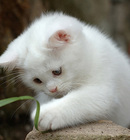Пух

In Russian when we want to express how light (in weight) something is we compare it to «пух», “down” or “fluff” or a piece of fluff, «пушинка».
| Что же может быть в этой посылке, она как пух легкая! | "What could be in this package; it is as light as fluff!" |
| Ты так похудела, просто пушинка! | "You lost so much weight, you weigh like a feather!" |
 Пух is a noun of masculine gender that has no plural form. The diminutive is пушок. There can be various adjectives formed from the word пух: пуховый or пуховой and пушистый. The first two mean something made out of down. There can be пуховое одеяло or пуховик, which is essentially a comforter or a пуховка, “down jacket”. However, the third adjective means ‘fluffy’ and is used to describe fur, hair or fabrics. A cat can also be пушистый. In fact, a very popular cat name is Пушок, which is sort of like Fuzzball or Fluffball. Interestingly enough, Winnie the Pooh in Russian is translated as Винни Пух. The reason for it might be just similar sounding Pooh and Пух; however, it fits well – Winnie is a fluffy toy!
Пух is a noun of masculine gender that has no plural form. The diminutive is пушок. There can be various adjectives formed from the word пух: пуховый or пуховой and пушистый. The first two mean something made out of down. There can be пуховое одеяло or пуховик, which is essentially a comforter or a пуховка, “down jacket”. However, the third adjective means ‘fluffy’ and is used to describe fur, hair or fabrics. A cat can also be пушистый. In fact, a very popular cat name is Пушок, which is sort of like Fuzzball or Fluffball. Interestingly enough, Winnie the Pooh in Russian is translated as Винни Пух. The reason for it might be just similar sounding Pooh and Пух; however, it fits well – Winnie is a fluffy toy!
| Тебе не холодно, хочешь, пуховое одеяло принесу? | "Are you cold, do you want me to bring you a comforter?" |
| Сегодня на улице очень холодно и Вася одел пуховку. | "It’s very cold outside today; Vasya wore a down jacket." |
Also, there is пухлый that describes someone chubby, often unhealthy; while пухленький is usually used in a positive sense, as an attractive quality.
| Какой милый пухленький малыш! Так бы и ущепнула за щечку! | "What a cute chubby baby! I just want to pinch his little cheek!" ¹ |
There are various expressions and idioms in Russian that use пух. For example, instead of saying “good luck”, we say, «Hи пуха, ни пера!» “neither down nor feather!” If you think this is weird, check this out! The standard response to this is «К чёрту!» “To devil!” Even though it doesn’t make much sense, I feel better, when someone says it to me before my exams.
Another good one is «в пух и прах». This idiom means “to the maximum”, “completely” or “utterly”.
| Армия врага была разбита в пух и прах. | "The enemy’s army was defeated utterly." |
| Куда ты собираешся, разоделась в пух и прах? | "Where are you going with your best clothes on?" |
Lastly, «рыльце в пушку» “snout in down/feathers” means that someone is not as innocent as they try to appear, just like “have a finger in a pie”. This idiom comes from a fable about a fox that wanted to appear innocent but its muzzle was covered with chicken feathers.
| — Марина рассказала учительнице, что я списывала, а сама то же самое делает! — Да, рыльце у неё в пушку, я тоже видела, как она подглядывала! |
“Marina told the teacher that I was cheating but she is doing the same thing!” “Yes, but she was just as guilty; I saw her peeking too!” |
When I was little I really liked different riddles. I remember one time in class in elementary school our teacher decided to have a tricky question hour. Whoever would answer the most riddles would get a prize. It is funny that the question that got me my prize was very easy, “what is heavier: a kilogram of nails of a kilogram of down?” However, no one in my class seemed to know the answer right away. I remember I got up and said, «Они весят одинаково - один килограмм!», “they weigh the same – one kilogram!”… I couldn’t be prouder of myself that day! ![]()
¹ Don comments: Although “What a cute, chubby baby!” is an accurate translation of the Russian sentence, I should warn Russian readers never to call an American baby fat or chubby. The parents will be offended.
2 comments
I’m a native speaker and I can confirm that I’ve heard the phrase “разоделась в пух и прах", though it is not something widely used.
Never heard ‘пуховка’, though it may be just not used here, near Moscow – much like siberian people use “мультифорка", and no Muscovites are familiar with this word.
Dear Tatiana,
Thank you for your interesting article!
Although I’d like to say that I rarely (if ever) hear the word “пуховка” (as the Russian for “down parka"). The one that is used instead is “пуховик".
And, to me (as a native speaker)the phrase “Куда ты собираешся, разоделась в пух и прах?” does not make sense. Like you said, “в пух и прах” means “completely” or “utterly” (e.g. “он проигрался в пух и прах” meaning “he’s tapped out all the money in the casino"). But you cannot “разодеться в пух и прах".
Again, thank you for the post.
Best, Kirill
Don responds: Kirill is a native speaker of Russian. Tatiana is also a native speaker of Russian. One of the most odd parts of discussing language is the fact that sometimes some native speakers say “You can say X” and other native speakers say “You cannot say X.” Go figure.
The reason for this is that it is inaccurate to think that there is such a thing as a language. The truth is this: people talk. When a great number of people talk sort of the same way, we call this a language. But really the grammar and lexicon and syntax of each of those people is slightly different. Even people in the same family speak somewhat differently. In other words, not all native speakers of a language speak the same way. Frankly, that’s pretty damn frustrating for the rest of us who think that we are studying a language and want to somehow figure it out like the solution to a Rubik’s cube.
For other non-native readers I want to give a piece of advice. Bear in mind that there are parts of a language that are very consistent from native-speaker to native-speaker. There are others that are less consistent. Your responsibility is to figure out from standard references what the best approach is for your personal situation.
If it seems unfair to you that you should have to figure out what is good or not good for your situation, I can only say that all of life is like that. Get used to it.
Form is loading...